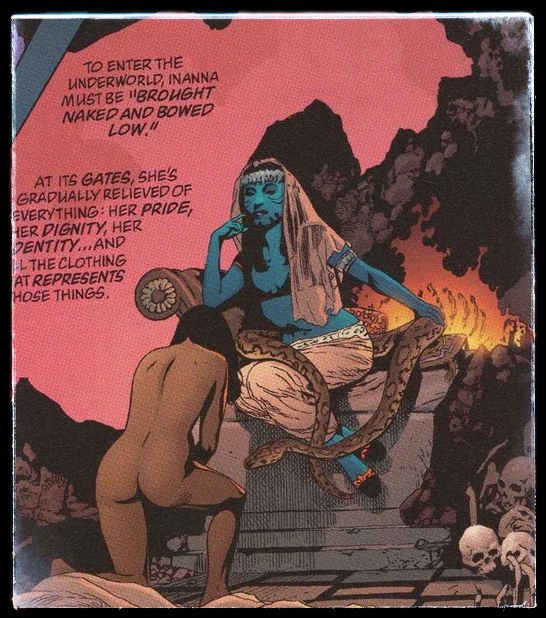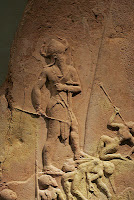The Descent...
For as long as I can remember, I have been told by other writers and students of myth, that the Descent is a story of transformation; describing how The Call awakens a person to some truer sense of themselves, reveals to the brave soul who accepts - some deeper purpose in life.
From the Descent of Inanna who Opened her ear to the Great Below, to the story of Persephone who was dragged screaming from the seemingly endless summer-fields of flowers, sunshine and friendship, down into the realities of incest and rape. To the hapless Dumuzi, the husband who doesn't notice that his wife (Inanna) is in deep, deep trouble, to the noble Jesus who takes the Bodhisattva vow a step too far...Even Orpheus who sang his way through Hell to bring back his wife...
The Descent does not make any of the mythic travelers who dare to cross the boundaries between sky and earth, wise.
No
Not one.
None who returned were better, kinder, or more clever than they had been, or in anyway improved by their encounters with The Deep.
Others wiser and more kind, already knew how to respect the living and the dead.
The deals struck with The Deep could not improve life for anyone, it simply changed things.
It seems to me that of all those 'who saw The Deep' none returned with anything more profound than the right to say to the living that they had seen The Deep; quite frankly - they may as well have taken a nuclear powered Soviet ice-breaker to the Antarctic and brought back amazing photographs.
The Deep is surely something more than that, you may think?
I disagree.
The fame of the post-Orphic returners rested upon their capacity to have made a bargain with the Deep. Orpheus and Jesus promised Persephone's Summerland to those who follow their teachings; the endless heavenly grasslands ruled over by Osirus deep within Sokar. Whilst Inanna and Persephone returned shocked and traumatized trailing demons that promise no escape...There was no annihilation for those who came back. But nor was there any way to avoid the consequences.
The myth of The Call says that annihilation is the basis of the initiation rituals in many mystery traditions. The novice must die so that the initiate may be born. This is another myth. The essence of true transformation cannot be a complete annihilation, for without the self there can be no rebirth of anything more complex than inherited, animal memory.
The desire to destroy comes from a necessarily terrible part of the soul - our protector - who wants to hurt those who hurt us. The blaming of the self to the tearing down a self that isn't 'good enough' or destroying a culture to rebuild something better, appeals to the traumatized self, as an heroic task.
In truth it is just one more suicide bomber.
The myth of The Call says that spiritual growth requires us to face fear and pain. It says that a journey within or without requires courage and faith. The myth says that to hear the Call and to answer it requires accepting annihilation of the old self in order to transform and give birth to the new.
And yet, fundamentally we all know that the changes that overcome the dead annihilate them into the fabric of the world. The grass may be greener over the burial. The dead flesh may give birth to worms and flies. But it must be obvious to everyone forever and a day that only the living can change themselves into something more than they are now.
The lesson of Inanna's journey to The Great Below is at its core, the same one within The Epic of Gilgamesh. That no matter how great a person is, hero or full God, the rules of death are implacable.
But only a God or hero could be stupid enough to think otherwise.
Perhaps the only lesson worth taking from these stories is, I think the message that none who faced The Deep and returned, accepted annihilation.
This is something that really needs to be understood...
Nevertheless everyone has the capacity to turn their ear to The Great Below...
And if the journey has to be made
A traveler requires a map.
And a book of etiquette.
In cultures that respect and describe The Deep, stories contain holographic maps...
Rewriting those stories for a scientific age
Is a challenge.
The Deep is Thanatos and Eros
The birthplace and death place of all.
But without the stories to weave sex and death into life..
We are left with Prozac and Therapy.


